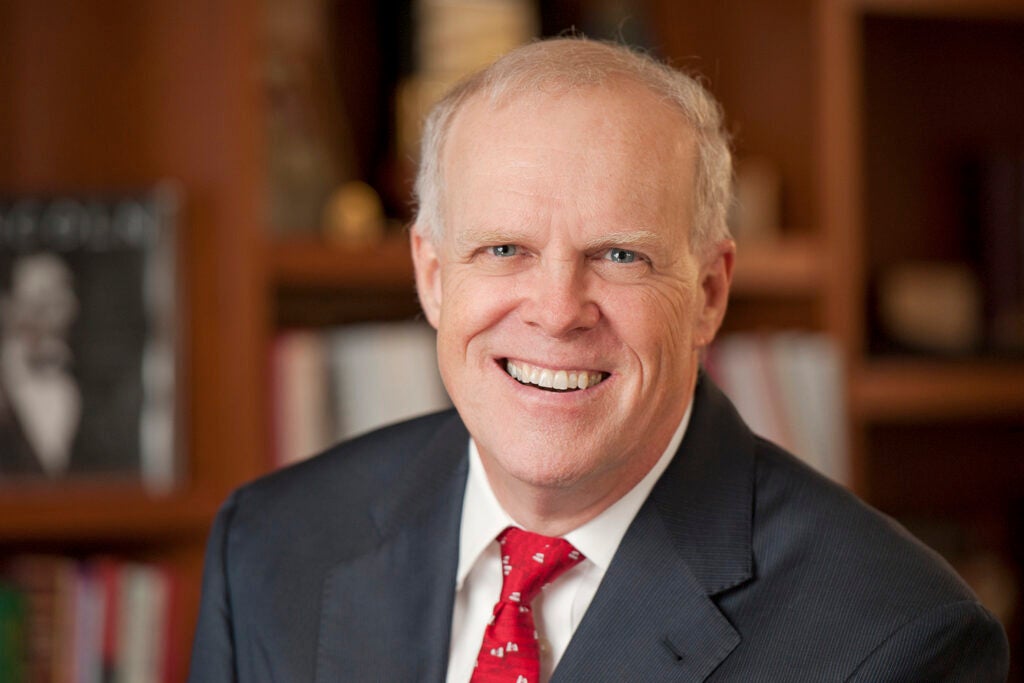John Hennessy to receive the National Science Board Vannevar Bush Award
The former Stanford president is honored for his pioneering work in computer science and his dedication to supporting future leaders in the sciences, and beyond.
Former Stanford President John Hennessy is the recipient of the National Science Board’s (NSB) 2024 Vannevar Bush Award, which honors exceptional lifelong leaders in science and technology. NSB is the governing board of the National Science Foundation (NSF) and established this award in 1980 in memory of Vannevar Bush, who inspired the creation of the NSF.
“We are thrilled to celebrate John Hennessy as this year’s Vannevar Bush Award recipient,” said Dario Gil, the chair of the board’s External Engagement Committee and senior vice president and director of IBM research. “His pioneering advances in computer architecture and dedication to building the future STEM workforce not only reflect the ideals set forth by Vannevar Bush, but they also help spur our national economy and security.”
“I am deeply honored by this award,” said Hennessy. “I have been privileged to work with many outstanding students and faculty colleagues, and this award reflects the accomplishments we achieved together.”
Hennessy is the Shriram Family Director of Knight-Hennessy Scholars, the largest university-wide, fully-endowed graduate-level scholarship in the world, which he co-founded with Phil Knight, MBA ’62, philanthropist, American businessman, and co-founder of Nike Inc. In the School of Engineering, Hennessy is the James F. and Mary Lynn Gibbons Professor and professor of electrical engineering and of computer science.
Hennessy will receive the Vannevar Bush Award on May 1, 2024, during the NSF Awards Gala at the Renwick Gallery in Washington, D.C.
The accidental entrepreneur
Hennessy joined Stanford’s faculty in 1977 as an assistant professor of electrical engineering. In 1981, he drew together researchers to focus on a technology known as RISC (Reduced Instruction Set Computer), which revolutionized computing by increasing performance while reducing costs. Hennessy helped transfer this technology to industry, co-founding the company MIPS Computer Systems in 1984.
His subsequent research focused on multiprocessor systems, including the DASH and FLASH projects, both of which pioneered concepts now used in industry.
Hennessy was appointed as the inaugural Willard R. and Inez Kerr Bell Professor of Electrical Engineering and Computer Science at Stanford in 1987, then went on to serve as chair of Computer Science (1994-1996), dean of the School of Engineering (1996-1999), and university provost (1999-2000) before being appointed as Stanford’s 10th president. As president, he focused on increasing financial aid and developing new initiatives in multidisciplinary research and teaching. “Universities need to be more outward looking – how can they contribute to understanding and solving big problems like climate change?” Hennessy said.
Hennessy was the founding board chair of Atheros Communications, one of the early developers of Wi-Fi technology, and has served on the board of Cisco and Alphabet (Google’s parent company), where he is currently chairman of the board. He is the co-author, with David Patterson, of two internationally used textbooks in computer architecture. He and Patterson are currently finishing the seventh edition of their textbook.
Supporting the next generation of scholars
During his early days in academia, Hennessy was chosen as part of the very first cohort of the NSF Presidential Young Investigator Award (now known as the NSF CAREER award). “I loved being a graduate student,” Hennessy said. “It was that magic combination of finding something I loved doing and also aligned with the way my brain worked.”
Motivated in part by a desire to provide other graduate students with a chance to experience that same magic, Hennessy co-founded Knight-Hennessy Scholars in 2016. “With Knight-Hennessy Scholars, we are cultivating a growing global community of visionary, courageous, and collaborative leaders committed to creating positive change in the world,” he said.
Knight-Hennessy Scholars delivers engaging experiences that prepare graduate students from across Stanford to address complex challenges facing the world. The goal is to educate and train a multidisciplinary and multicultural community of scholars for leadership roles in academia, industry, government, nonprofits, and the community at large.
Knight-Hennessy scholars participate in the King Global Leadership Program and receive up to three years of financial support to pursue a graduate degree program in any of Stanford’s seven graduate schools.
Knight-Hennessy Scholars and this honor both reflect Hennessy’s dedication to learning and knowledge creation, and to helping develop the next generation of leaders who also share those passions.
“I’m a lifelong learner,” he said. “As Vannevar Bush said, science is the new frontier. There are still so many questions to resolve, especially on the nature of life and the universe.”
This is adapted from a press release issued by the National Science Board of the National Science Foundation.

